Conduct a California warrant search right away by visiting local court office public access terminals or searching online.
Fortunately, there are public resources available to California residents looking to access details on wanted individuals. Warrants are a matter of public record in California; judges can issue a warrant for the arrest of a suspect if there is sufficient reason to believe that the individual committed an offense. Warrants include the name and address of the suspect, along with the crime they’re suspected of committing.
Utilize this streamlined resource to find helpful links and steps for finding information on anyone wanted throughout the state.
Are CA Warrant Records Available to the Public?
Yes, warrant records are available to the public in California, with some caveats. According to the California Penal Code 1534(a), warrants issued throughout the state are classified as judicial records.1
However, state statutes dictate that executed or returned warrants become open to the public 10 days after their execution. Law enforcement agencies have the right to exercise their discretion when deciding whether to disclose information relating to arrest warrants.
When performing a warrant search in California, it’s useful to know the kind that may have been issued. All warrants are not the same and there are various types available to the public.
Some common warrant types include:
- Arrest Warrants
- Bench Warrants
- Extradition Warrants
- Search Warrants
Not all of these warrants are available to the public immediately. For example, a search warrant may not be published until after it’s been executed, as making such information public could interfere with law enforcement operations.
However, if disclosing a warrant would not interfere with an active investigation, it is most likely possible to find information about it using court records that are accessible to the public free of charge.
A Look at Searching for Warrants in California
U.S. citizens have a right to access government information and public records, as protected by the National Freedom of Information Coalition (NFOIC).2 There are several ways to search for information about warrants in California, and many court and law enforcement databases are available online for no fee.
To perform a state warrant search, individuals must first know the person’s first and last name and the state where it was issued.
The more information the searcher has, such as the subject’s date of birth and the county or city they currently live in, the easier it will be to narrow down the search. Warrants may be issued by state or county law enforcement, city sheriffs, or federal law enforcement agencies, depending on the nature of the crime. Where county-level records are available, checking these before trying city databases is typically the quickest way to find the desired records.
Warrants can be issued for a variety of reasons and tend not to expire. So it’s possible to end up with a warrant for something minor like a speeding ticket and have it remain active for many years.
In California, warrants are not generally made a matter of public record until they’re executed. However, some active warrants do get published online, especially if making them a matter of public record is unlikely to interfere with the outcome of an active police investigation.
How To Perform a California Warrant Search Seamlessly
There are 58 trial courts in California, one representing each county.3 These courts can be a useful source of information about warrants.
While some courts allow individuals to search case records for free online, others may require people to contact the clerk of court to request information.
The contact details for some of the county courts for the biggest counties in California are provided below:
| Department | Address | Phone Number |
| Los Angeles County Court | Central Arraignment Courthouse, 429 Bauchet St., Los Angeles, CA 90012 |
213-830-0845 |
| San Diego County Superior Court | 1100 Union St, San Diego, CA 92101 |
619-844-2700 |
| Orange County Court Clerk | 700 Civic Center Drive West Santa Ana, CA 92701 Roseburg, OR 97470 |
657-622-6878 |
| Alameda County Superior Court | 2233 Shoreline Drive, Alameda, CA94501 |
510-891-6005 |
| Fresno County Superior Court | 2317 Tuolumne Street, Fresno, CA 9371-1200 |
559-457-1700 |
Some courts require people to register for an account to search court records or prefer users to call a self-service number or contact the clerk of court to request information.
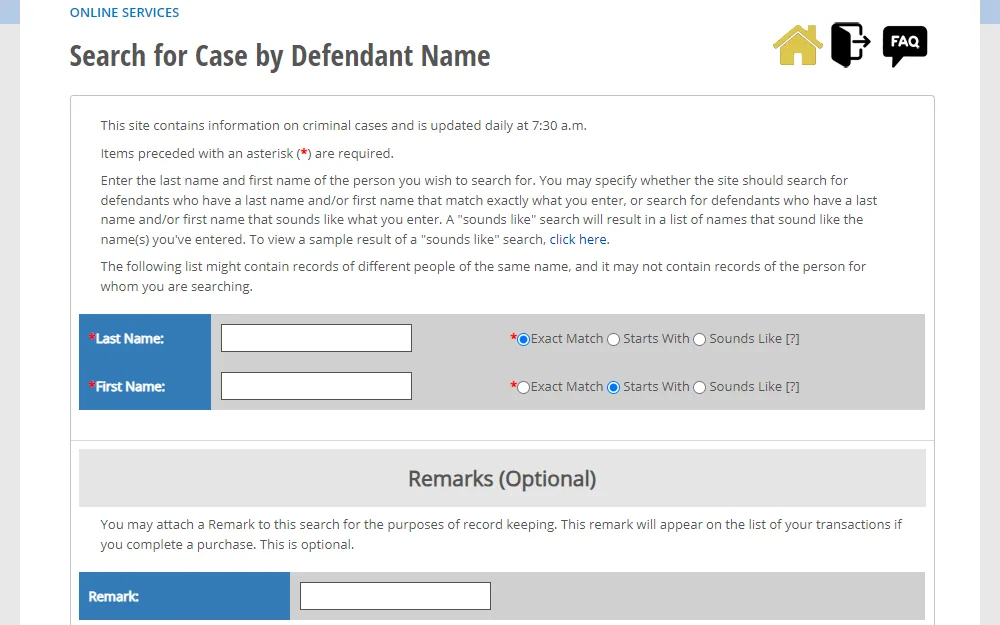
Another useful source of information is county sheriff’s offices. Some contact details for sheriff’s offices in California are provided in the table below:
| Department | Address | Phone Number |
| Los Angeles County Sheriff’s Department | 211 W Temple St, Los Angeles, CA 90012 |
213-229-1700 |
| San Bernardino County Sheriff’s Department | 655 3rd St, San Bernardino, CA 92415 |
909-884-0156 |
| Orange County Sheriff’s Department | 550 N Flower St, Santa Ana, CA 92703 |
714-647-7000 |
| Alameda County Sheriff’s Office | 1401 Lakeside Drive, 12th Floor, Oakland, CA 94612 |
510-667-3685 |
| Fresno County Sheriff’s Office | 2200 Fresno St, Fresno, CA 93721 |
559-600-8402 |
Some county sheriff’s offices publish most wanted lists, which can also be a useful source of information when performing a warrant search in California.
The following resources also provide streamlined guidance for accessing warrant details in specific CA counties, and can be reviewed for clear steps and insights for their respective jurisdictions:
- Alameda County Warrant Lookup Instructions
- Steps for Finding Contra Costa County Warrant Details
- Kern County Warrant Search Guidance
- Los Angeles County Wanted Person Search Overview
- Instructions for Accessing Details on Anybody Wanted in Santa Clara County
- Steps for Checking Records of Wanted Individuals in Riverside County
- Search Methods for Reviewing All Wanted Persons in San Diego County
- Lookup Guide for Viewing Warrant Information in San Bernardino County
- Fresno County Most Wanted Search Tutorial
Access Warrant Information via Municipal Agencies in CA
In addition to county agencies, it may also be possible to obtain information about warrants from Municipal agencies.
The Bakersfield City Police Department has a records department that is willing to provide certain kinds of public records upon request. Interested parties can visit the police department during office hours or fill out a public records request online.5
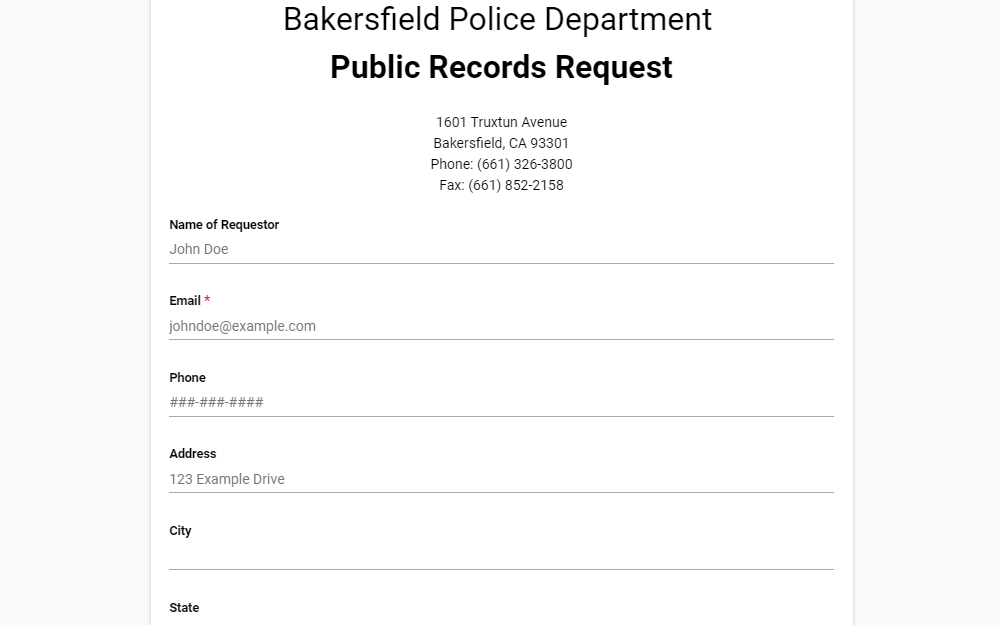
Contact the Bakersfield City Police at the following address:
Bakersfield City Police Department
Record Office
1601 Truxtun Avenue
Bakersfield, CA 93301-5109
Phone: 661-326-3966
Hours: Monday – Friday, 8 AM to 3 PM
The City of Anaheim Police Department also provides information for requesting public records. Interested parties can download a public records request form, which can then be submitted to the following address:7
Office of the City Clerk
Custodian of Records
200 S. Anaheim Blvd
Anaheim, CA 92805
Fax: 714-765-4015
Email: [email protected]
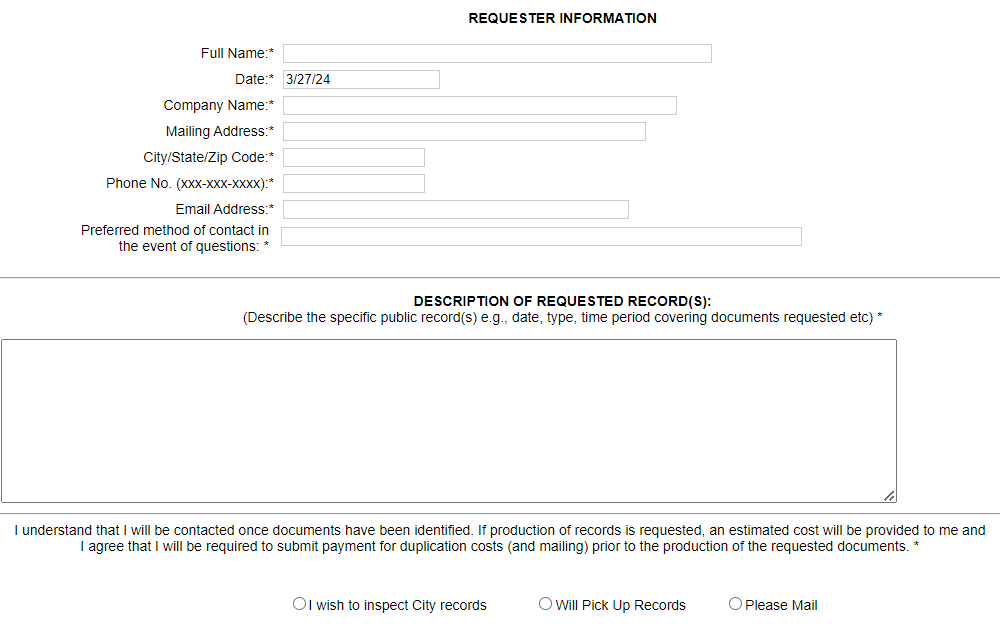
Not all police departments provide convenient links for accessing public records. Contact details for police departments that do not offer online services for search warrants are provided in the table below. Call the office to request information about public records.
| Police Department | Address | Phone Number |
| Ferndale Police Department | 600 Berding Street P.O. Box 1096 Ferndale, CA 95536 |
707-786-4025 |
| El Monte Police Department | 11333 Valley Boulevard, El Monte, CA 91731 |
626-580-2100 |
| Fowler Police Department | 128 S. 5th Street, Fowler, CA 93625 |
559-834-3254 |
| Hawthorne Police Department | 12501 S. Hawthorne Blvd, Hawthorne, CA 90250 |
310-349-2700 |
| Huntington Beach Police Department | 2000 Main Street Huntington Beach, CA |
714-960-8811 |
It’s important to note that police departments will not provide information about active warrants that have not been actioned as this may interfere with their ability to conduct investigations.
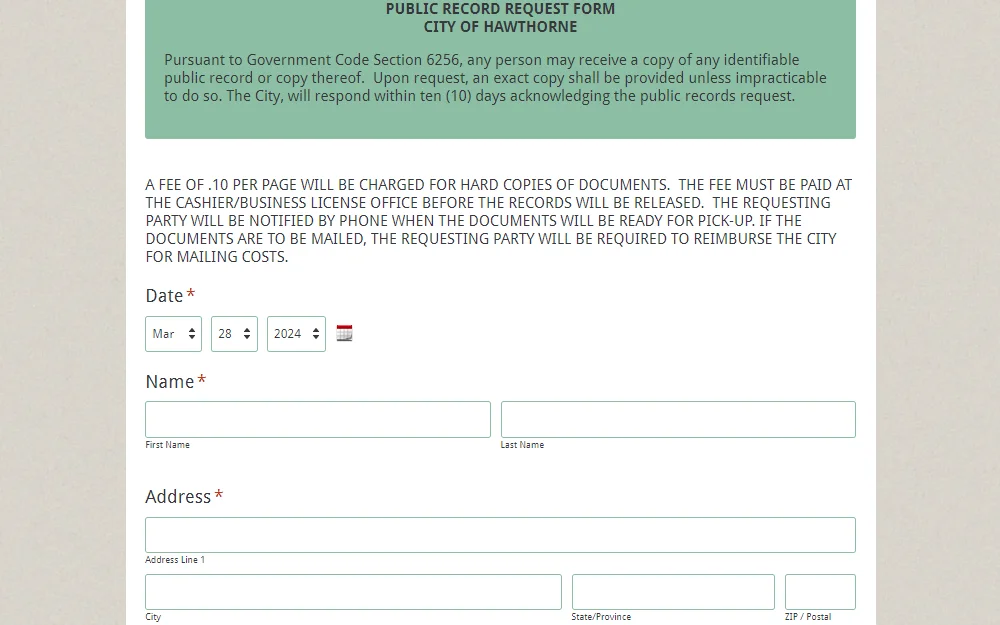
In addition, police departments do not keep general records of warrants, so will not have information about a warrant that was issued by a different city’s law enforcement officers.
Go Beyond California & Look Up Federal Warrants Throughout the Whole U.S.
If someone is wanted for a federal crime, there may have been a federal warrant issued against them. These warrants are far less common than state-level ones.
It’s possible to find federal arrest warrants and search warrants by looking up a person’s court history on the PACER Case Locator (Public Access to Court Electronic Records).9 To find information about warrants:
- Login to PACER
- Search the Person’s Name
- Click Case Number, then select Docket Sheet / Docket Report or History/Documents
Unlike other tools listed, PACER is not free to use. There is a nominal fee based on the number of pages accessed. The PACER website provides a breakdown of current prices. The site includes information about all court documents filed in the United States dating back to 1999.
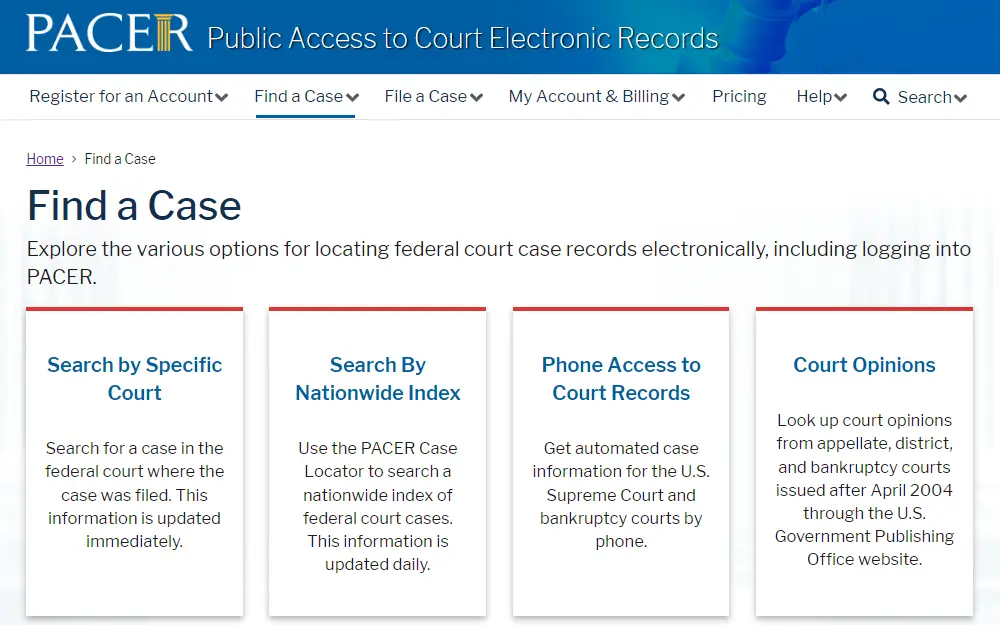
United States citizens have a right to access certain government and court records, but this right comes with the responsibility to use the information appropriately. Access to court records is provided for personal use, and irresponsible use of public records is punishable by law.
In addition to looking up court records on PACER, some other useful sources of information include:
- FBI’s Ten Most Wanted Fugitives List
- U.S. Drug Enforcement Administration’s Fugitive List
- US Marshals Most Wanted Fugitives List
- Contact bail bondsmen to inquire about warrants; if a defendant has not requested exclusivity, the bail bondsman may be able to disclose information that could be used to help locate a person’s warrant.
Different Types of Warrants in CA & the Reason for Each
There are several types of warrants that can be issued by a judge in California. Some of the most common warrant types are listed below.
- Arrest Warrants: Under California Penal Code 836, law enforcement officers can arrest someone in the state without having a warrant if the suspect committed a crime in an officer’s presence.11 However, an arrest warrant is required if the officer did not witness the crime but has reason to believe that the suspect has violated California penal code.
- Search Warrants: A search warrant allows law enforcement officers to search a person’s property (or vehicle/business property) for evidence of illegal activities. If law enforcement officers find such evidence, the warrant also allows them to seize it.
- No-Knock Warrants: A no-knock warrant is a form of search warrant that allows law enforcement officers to enter a person’s property without knocking/ringing the doorbell or otherwise giving notice. These warrants may be issued if an officer believes that the suspect may flee or be a danger to others if they’re given notice of a search.
- Bench Warrants: A California bench warrant allows police officers to arrest citizens who have failed to comply with court order processes. For example, a bench warrant may be issued for someone who has violated a court order, failed to pay a court-ordered fine, violated the terms of their probation, or failed to pay spousal support.
- Child Support Warrants: If an individual owes child support payments, they may have a warrant issued against them. This warrant can be civil or criminal, depending on the amount of child support owed and other circumstances surrounding the case.
If a warrant is “active,” this means it was issued and has not yet been executed. If a person believes a judge issued a warrant in error, they can take steps to resolve this; clearing a warrant is discussed in more detail below.
What Should I Do if I Discover I or Someone Else Has a Warrant in California?
If someone discovers there is a warrant out against them in California, that person can contact the court and request a hearing to have the warrant cleared. The court has the discretion to do this if the defendant has resolved the issue the warrant relates to.
Depending on what the warrant is for, resolving the issue may mean paying a fine, setting a court date or seeking help from a bail bondsman and legal advisor before turning themselves in.
It is sometimes possible to have a search warrant made invalid in California. For example, under the Fourth Amendment, police officers must prove to a judge that probable cause exists to believe the suspect has committed a crime or that a warrant search will show evidence of criminal activity.12 If a police officer cannot convince a judge of this, then the judge will not issue a warrant.
A warrant can be invalidated if any of the following apply:
- The police officer failed to comply with the terms of the warrant.
- The affidavit for the search warrant contained incomplete information.
- The police officer lied about the information in the affidavit.
- The warrant was based on old or illegally obtained evidence.
Do not ignore warrants, even ones for something minor, such as a traffic offense. While an arrest warrant may be subject to a statute of limitations, bench warrants do not expire, and if a person is stopped by the police for something unrelated and it’s found there’s a warrant out against them, they could end up being faced with much bigger fines or penalties.
Speaking to a bail bondsman or a legal expert before taking action to clear an active warrant can offer some insight into the best course of action.
If someone is concerned for their safety after learning that a third party has an active arrest warrant, they have the option of notifying law enforcement. Law enforcement can be contacted either by calling 9-1-1 or contacting the local law enforcement office.13 Some useful tip lines include:
- 911 or the FBI-JTTF at 415 for urgent threats
- 1-866-FOR-TTIP for non-urgent tips and leads
In the event that someone thinks they have spotted a person who appears on a wanted list, they should not approach that individual. Call a tip line or the local police immediately and let them decide the best approach.
Thanks to court databases such as PACER and resources provided by local sheriffs and police departments, it’s possible for people to access warrant information in California for free. If a California warrant search turns up a concerning result, it’s important to seek legal advice to ensure the best possible outcome for the individuals involved.
If interested in digging deeper, look through the California free public information search tutorial and the CA arrest and criminal history lookup instructions to reveal details of probationers, parolees, court proceedings, inmates, mugshots, and more.
References
1California Legislative Information. (2021). CA Penal Code § 1534. Retrieved March 27, 2024, from <https://leginfo.legislature.ca.gov/faces/codes_displaySection.xhtml?lawCode=PEN§ionNum=1534.>
2National Freedom of Information Coalition. (n.d.). Who we are. Retrieved March 27, 2024, from <https://www.nfoic.org/about/>
3Judicial Council of California. (n.d.). Find Your Court. Retrieved March 27, 2024, from <https://www.courts.ca.gov/find-my-court.htm?query=browse_courts>
4Los Angeles County Superior Court of California. (n.d.). Search for Case by Defendant Name. Retrieved March 27, 2024, from <https://www.lacourt.org/paos/v2/CriminalIndex/Search>
5Bakersfield, California. (n.d.). Public Records Requests. Retrieved March 27, 2024, from <https://bakersfieldca.justfoia.com/publicportal/home/newrequest>
6Bakersfield Police Department. (n.d.). Public Records Requests. Retrieved March 27, 2024, from <https://bakersfieldca.justfoia.com/Forms/Launch/0a3d2b39-4eb1-4f4e-83eb-fedb2ee2a74d>
7Anaheim City Clerk’s Office. (n.d.). Request a Public Record. Retrieved March 27, 2024, from <https://www.anaheim.net/2153/Request-a-Public-Record>
8Hawthorne Police Department. (n.d.). Public Record Request Form. Retrieved March 27, 2024, from <https://hawthorneca.formstack.com/forms/public_record_request_form>
9Administrative Office of the U.S. Courts. (n.d.). PACER Case Locator. Public Access to Court Electronic Records (PACER). Retrieved March 27, 2024, from <https://pcl.uscourts.gov/pcl/index.jsf>
10Administrative Office of the U.S. Courts. (n.d.). Find a Case. Public Access to Court Electronic Records (PACER). Retrieved March 27, 2024, from <https://pacer.uscourts.gov/find-case>
11California Legislative Information. (2013). CA Penal Code § 836. Retrieved March 27, 2024, from <https://leginfo.legislature.ca.gov/faces/codes_displaySection.xhtml?lawCode=PEN§ionNum=836.>
12Cornell Law School, Legal Information Institute. (n.d.). Good Faith Exception. Retrieved March 27, 2024, from <https://www.law.cornell.edu/constitution-conan/amendment-4/good-faith-exception>
13California Commission on Peace Officer Standards and Training. (n.d.). California Law Enforcement Agencies. Retrieved March 27, 2024, from <https://post.ca.gov/le-agencies>
